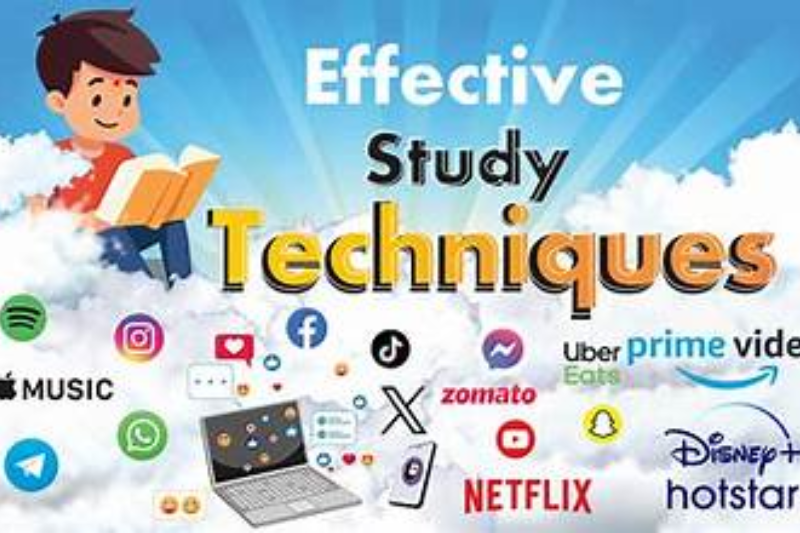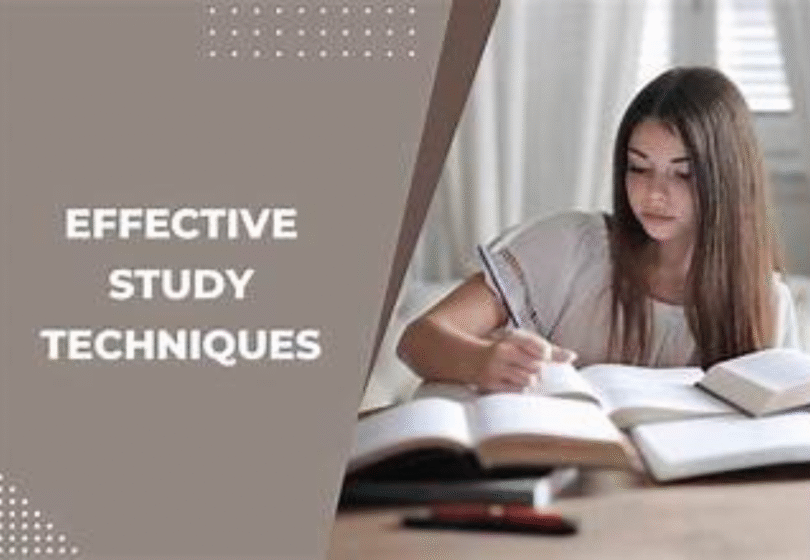Hello there! Let me ask you a simple question — have you ever studied for hours, only to realize you’ve forgotten most of it by the next day? Frustrating, isn’t it? The problem isn’t you; it’s the way you’re studying. The secret lies in using effective study techniques that help you absorb information faster, remember it longer, and apply it confidently.
In this friendly guide, I’ll walk you through everything you need to know about effective study techniques, the best methods you can use, and how they’ll transform the way you learn.
What Do We Mean by “Effective Study Techniques”?

Effective study techniques are strategies that make your study sessions more productive and meaningful. They are not about studying harder, but about studying smarter. Instead of spending endless hours reading notes passively, these methods encourage active learning, better focus, and stronger memory recall.
Why Are Effective Study Techniques So Important?
In today’s fast-paced academic environment, simply “reading and rereading” is not enough. Here’s why effective study techniques are a game-changer:
- They help you understand concepts deeply, not just memorize them.
- You retain information for a longer period.
- You save time because you study efficiently.
- They reduce last-minute exam stress.
- They build your confidence in applying knowledge practically.
Top 10 Effective Study Techniques (Explained in Detail)
1. Active Recall
Instead of reading your textbook over and over, close it and try to recall what you just learned. Quiz yourself. This retrieval process strengthens your memory and understanding. It’s like training your brain muscles!
Example: After reading a chapter, try to write down all key points from memory.
2. Spaced Repetition
Spaced repetition involves revisiting the study material at increasing intervals — for example, after 1 day, 3 days, 7 days, and so on. This combats the “forgetting curve” and ensures long-term retention.
Pro Tip: Use apps like Anki or Quizlet to automate spaced repetition.
3. Pomodoro Technique
Study in focused blocks of 25 minutes, followed by a 5-minute break. After four sessions, take a longer 15-30 minute break. This keeps you mentally fresh and prevents burnout.
Why it works: Your brain stays alert during short bursts, avoiding fatigue.
4. Mind Mapping
Mind maps are visual diagrams where you branch out topics using lines, colors, and images. They help organize complex ideas and show how they connect.
Example: Instead of listing “Causes of World War I,” create a colorful web that links causes like militarism, alliances, imperialism, and nationalism.
5. Teaching Others (The Feynman Technique)
One of the best ways to master a topic is to teach it. If you can explain it in simple terms, you truly understand it. This method also highlights gaps in your knowledge.
Tip: Find a study buddy and take turns teaching each other.
6. Practice Testing
Regular self-testing through quizzes or mock exams prepares you for the actual exam environment. It also reveals weak spots that need more attention.
Don’t wait for teachers to test you—test yourself!
7. Interleaved Practice
Mixing different subjects or problem types during study sessions forces your brain to differentiate and adapt, leading to better problem-solving abilities.
Example: Instead of solving 10 math problems in a row, mix 3 math problems, 3 science questions, and 3 history facts.
8. Mnemonics & Acronyms
Create memory shortcuts using funny phrases, songs, or acronyms to remember complex information easily.
Example: Remembering planets with “My Very Educated Mother Just Served Us Nachos” (Mercury, Venus, Earth, Mars, Jupiter, Saturn, Uranus, Neptune).
9. Optimizing Your Study Environment
Choose a distraction-free, comfortable, and well-lit place to study. A tidy workspace improves focus and reduces procrastination triggers.
Digital tip: Use website blockers to keep you off social media during study time.
10. Healthy Body = Sharp Mind
Good physical health directly affects mental performance. Ensure you:
- Stay hydrated.
- Eat brain-boosting foods (like nuts & fruits).
- Get 7-8 hours of sleep.
- Take regular breaks to refresh your mind.
You may also like to read these posts:
Best Books for Students: A Must-Read Guide for Every Learner
Digital Libraries for Education: Unlocking Limitless Learning Opportunities
Study Materials for Exams: A Complete, Detailed Guide to Smarter Preparation
Open Educational Resources (OER): Everything You Need to Know
Benefits of Effective Study Techniques

| Benefit | Description |
| Better Retention | Techniques like spaced repetition help you retain information longer. |
| Time Efficiency | You learn more in less time by focusing on quality, not quantity. |
| Reduced Exam Stress | Regular practice testing and active recall reduce last-minute cramming anxiety. |
| Deep Understanding | Techniques like teaching others and mind mapping foster deeper comprehension. |
| Boosts Confidence | Being well-prepared through effective methods builds exam and presentation confidence. |
| Improves Problem-Solving Skills | Interleaved practice sharpens critical thinking and adaptability. |
Drawbacks of Effective Study Techniques (And How to Overcome Them)
| Drawback | Solution |
| Requires Consistency and Discipline | Start with short, manageable study sessions to build the habit. |
| Initial Setup Can Be Time-Consuming | Preparing flashcards or mind maps may seem tedious but pays off in the long run. |
| Active Recall Feels Hard at First | It’s supposed to challenge you! Stick with it and you’ll see improvements. |
| Spaced Repetition Needs Planning | Use apps to automate the schedule, so you don’t have to manually track intervals. |
| Not Always Suited for Rote Memorization | For pure memorization, mnemonics work better combined with active recall. |
Common Mistakes to Avoid While Studying
- Cramming before exams – Short-term cramming leads to quick forgetting.
- Studying with distractions – Multitasking lowers retention by up to 40%.
- Ignoring breaks – Continuous study sessions reduce focus and productivity.
- Passive learning – Simply reading or highlighting isn’t effective.
Final Thoughts: Make Studying Work For You
There’s no single “best” method for everyone, but a combination of these effective study techniques can completely change how you learn. The key is to experiment and find what clicks with you. Start with active recall and spaced repetition, and gradually add in techniques like mind mapping or the Pomodoro method.
Remember — it’s not about how long you study, but how effectively you do it. With these techniques, you’ll not only perform better in exams but also enjoy the learning process..
FAQs
Q1: What are the most effective study techniques for exams?
Q2: How can I improve my concentration while studying?
Study in a quiet, clutter-free environment.
Use the Pomodoro technique to work in short, focused sessions.
Keep your phone and distractions away.
Take regular short breaks to refresh your mind.








